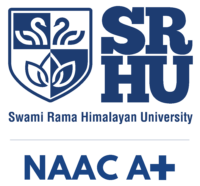Policy for Water Conservation
November 6, 2025 2025-11-15 6:35Policy for Water Conservation
Policy for Water Conservation
| Approved | Board of Management on 12th January 2019 |
| Notification | Notified by Registrar vide notification No. SRHU/Reg/OO/2019-04 (i) dated 15th January 2019 |
| Reviewed / Revised | Board of Management on 29th March 2022 |
| Notification | Notified by Registrar vide notification No. SRHU/Reg/OO/2022-58 (i) dated 5th April 2022 |
| Next Review | 2025–26 |
- Short Title & Commencement
- This Policy shall be called the “Policy for Water Conservation” of Swami Rama Himalayan University.
- This Policy shall be deemed to have come into force from the date of approval of the Board of Management of the University.
- PurposeThis policy establishes the framework for sustainable water management at SRHU. It provides guidelines for responsible usage, conservation, recycling, and recharge practices to ensure long-term sustainability of water resources on campus.
SRHU acknowledges its ecological responsibility and aligns its efforts with the UN Sustainable Development Goal 6 (Clean Water and Sanitation). Through this policy, SRHU pledges to:
- Promote a culture of water mindfulness and responsible use.
- Optimize water conservation and management practices in academic, healthcare, residential, and outdoor areas.
- Foster awareness through education, research, and community engagement programs.
- Contribute to the environmental well-being of the region.
- Scope
- Academic and administrative buildings
- Hospitals and healthcare facilities
- Hostels and staff residences
- Laboratories and research facilities
- Outdoor areas, irrigation, and landscaping
- GoalsThe policy goals are to:
- Reduce water consumption per capita across all facilities.
- Increase reuse and recycling of wastewater.
- Enhance groundwater recharge and reduce reliance on external water sources.
- Enhance groundwater recharge and reduce reliance on external water sources.
- Ensure water-efficient and sustainable infrastructure.
- Foster education and research on water conservation practices.
- Strategic Measures for ImplementationThe following measures will be taken to conserve water in the SRHU Campus:
- Buildings
- Install low-flow taps, showerheads, and dual-flush toilets.
- Promote use of waterless urinals.
- Adopt grey water recycling for irrigation and landscaping.
- Encourage energy-efficient building management practices such as closing doors/windows in conditioned spaces and switching off unused appliances to reduce indirect water consumption.
- New and Renovated Infrastructure
- Adhere to green building norms (IGBC/LEED) for water-efficient design.
- Integrate rainwater harvesting systems in all new buildings.
- Install water meters in major facilities for monitoring.
- Design landscaping with native drought-resistant plants.
- Water Treatment and Reuse
- Operate and maintain STPs using MBBR technology; reuse treated water for gardening, vehicle washing, and road cleaning.
- Operate ETPs for wastewater from laboratories and laundry to prevent contamination.
- Promote waterless urinals across the campus.
- Sustainable Campus Practices
- Maintain rainwater harvesting pits and rooftop storage for groundwater recharge.
- Implement a rooftop rainwater harvesting tank based on a 365-day model.
- Use drip irrigation and moisture sensor-based smart irrigation for landscaping.
- Awareness and Capacity Building
- Conduct annual awareness drives for students, staff, and faculty.
- Train stakeholders in water-saving practices and systems.
- Expand community training programs on water management, spring-shed management, and water quality monitoring.
- Research and Innovation
- Promote research and projects on water recharge and sustainable management.
- Support innovations such as SRHU’s patented ‘Direct Injection’ technique for recharging dried hand pumps.
- Encourage academic engagement through projects and curricula integration.
- ResponsibilitiesThis policy applies to all stakeholders of SRHU and will be managed by:
- University Leadership
- Oversee implementation and allocate resources for water conservation projects.
- Monitor effectiveness and ensure compliance with this policy.
- Evaluate conservation initiatives regularly.
- Facilities & Maintenance Department
- Operate and maintain STP, ETP, rainwater harvesting, and irrigation systems.
- Ensure installation and upkeep of water-efficient fixtures.
- Academic Departments and Research Units
- Integrate water conservation into research and projects.
- Encourage academic engagement with sustainable water practices.
- Faculty, Staff, and Students
- Adopt responsible water use in daily activities.
- Report leakages and wastage immediately.
- Actively participate in awareness and conservation initiatives.
- WATSAN
- Provide technical expertise in water and sanitation projects.
- Extend community outreach in water conservation and safe drinking water initiatives and implement schemes in remote villages.
- University Leadership
- Buildings
- This policy shall be reviewed every three years or earlier if required to accommodate new educational practices, regulatory requirements, or emerging student needs.
- The University reserves the right to interpret, alter, amend, modify, cancel or withdraw any or all provision mentioned herein above in this policy without any notice.
- In case of any dispute, the decision of the Vice Chancellor of the University shall be final and binding.

